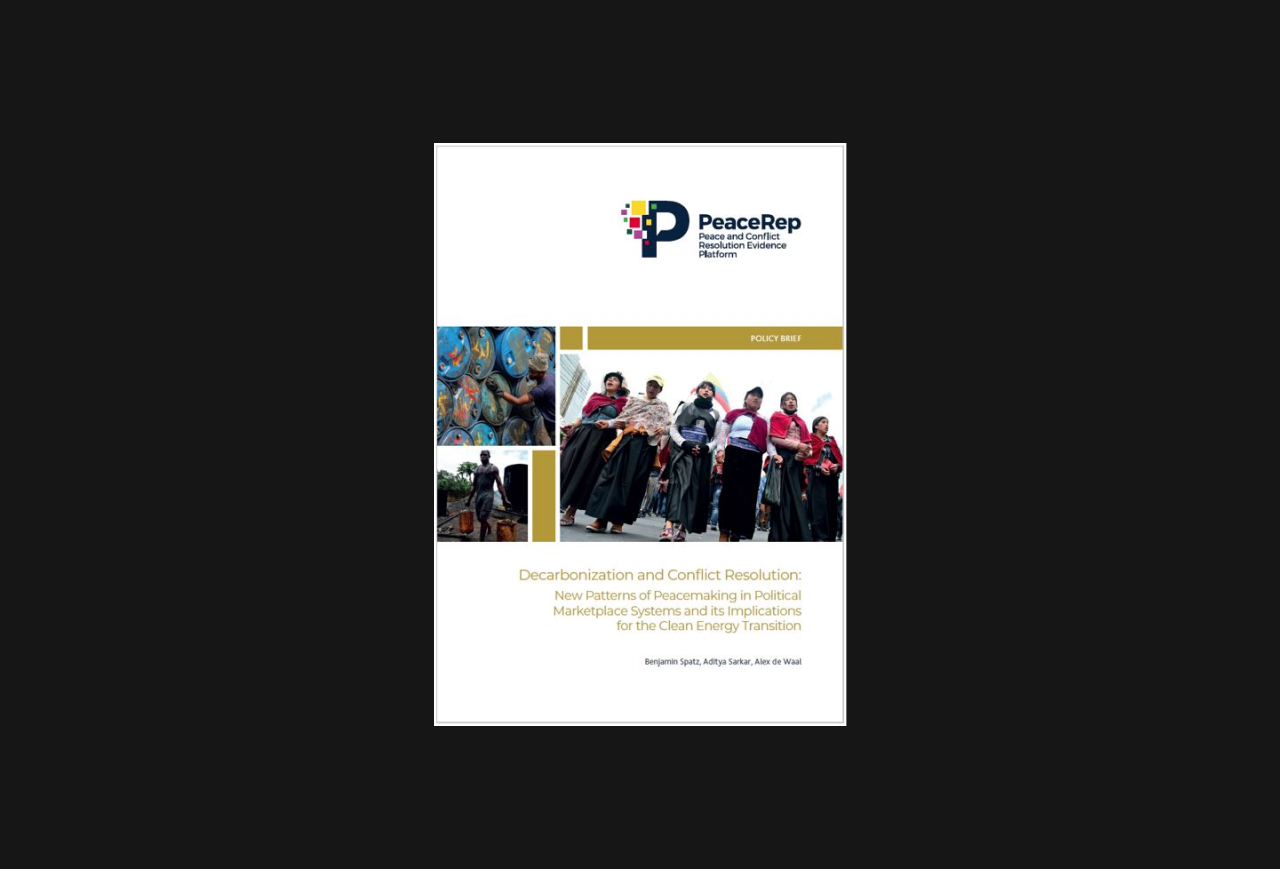By Jared Miller
From COP27 to the latest 30×30 agreement to protect 30 percent of the world’s oceans and land by 2030, there is greater global commitment to act to avert the worst aspects of climate change. A cornerstone in many of these environmental policies is a decarbonizing of our economies, and especially our energy sectors. While there is agreement among climate scientists that this is a necessary step, how will this global transition affect fragile oil and natural gas producing countries, arguably the least prepared or interested in such a transition? How will transactionally-focused politicians strike new political bargains as their oil-funded budgets diminish? These questions are key to better understand and proactively prepare for the destabilizing effect of a global energy transition, but they are ones for which we do not yet have satisfactory answers. Recent research from the World Peace Foundation and PeaceRep, supported by the United States Institute for Peace and United Kingdom’s Foreign, Commonwealth, and Development Office, seeks to change that.
In a forthcoming policy memo, Ben Spatz, Aditya Sarkar, and Alex de Waal, explain a surprising relationship between decarbonization and peacemaking. Turning the resource curse on its head, “decarbonization has an at least equally substantial effect compared with carbonization…it may not be oil that causes conflict. It may be the loss of oil that causes conflict” (Pospisil 2021). This is most pronounced in cases of “traumatic decarbonization,” the rapid, unplanned reduction in hydrocarbon revenues in states which are dependent on such revenues to sustain their current political systems.
The policy memo synthesizes research on decarbonization, conflict, and peacemaking with that of the Conflict Research Programme and the Peace and Conflict Resolution Evidence Platform. It further draws upon research conducted by the World Peace Foundation, including the “Carbon Compacts, Decarbonization, and Peace” project funded by the United States Institute of Peace and the World Peace Foundation. Empirical evidence comes from cross-national empirical evaluation of fragile oil-producing states and peacemaking outcomes, as well as case studies. Research was conducted by Shahla Al-Kli, Katrina Burgess, Javier Corrales, Joshua Craze, Alex de Waal, Tarun Gopalakrishnan, Luke Patey, Jan Pospisil, Aditya Sarkar, Ben Spatz and myself from 2020 to 2022.
Across the cases one thing is clear: declines in oil rents have critical implications for stability, violence, peacemaking, corruption, development, and humanitarian outcomes in carbon-dependent fragile states.
Key points from the policy memo:
- Oil is key to political finance. In
fragile states where governance institutions are weak, politics often centers
on transactional bargains among the elite rather than under the rule of law. We
call contexts such as these “political marketplaces.” In political
marketplaces, elite actors need rents that can be leveraged for their own
political finance. In states within this study – Ecuador, Iraq, Nigeria, South
Sudan, Sudan, and Venezuela – oil rents were a key source of political finance.
Access to or control over these rents was key to elite actors’ ability to
achieve and maintain political power.
- Decarbonization is potentially destabilizing. Hydrocarbon revenue today serves as a primary source of political finance to the extent that entire systems of government are constructed around it. The global transition away from fossil fuels will eliminate such political finance and risks upsetting the associated elite deals unpinned in precisely the contexts where governments are least well-equipped to manage the transition.
- Availability of discretionary oil rents impacts patterns of peacemaking. Evidence drawn from University of Edinburgh’s Peace Agreements Database on peace agreements suggests that comprehensive peace agreements tend to happen more often when more political funds are available. Similarly, more limited peace agreements happen with political funds are scarce. This has major implications for peacemaking—as Jan Pospisil put it in a forthcoming paper, “it may not be oil that causes conflict. It may be the loss of oil.”
- The ‘rules of the game’ are sticky. Evidence from the case studies suggests thatdecarbonization reshapes states’ political economies, but overall, does not reshape these political systems. That is, there is no move toward accountable, democratic systems of governance. Yes, there are winners and losers, and shifts in sources of political finance, but the fundamental transactional nature of the political system did not shift. These states remained elite-driven, rent-seeking, transactional, and often-violent political systems. The loss of carbon rents forced actors to seek out alternative sources of rents and increased competition for rents that still existed.

Decarbonization and Conflict Resolution: New Patterns of Peacemaking in Political Marketplace Systems and its Implications for the Clean Energy Transition
At a time when there is greater consensus to transition to renewable sources of energy and decarbonize our economies, we need to also understand the political implications of the scientifically-based policy responses to climate change. Yes, decisive action is needed on climate change, but as we take action, how will proposed policies impact carbon-based political marketplaces and what can be done to mitigate the destabilizing impact of such a transition? Answering these questions requires understanding the transactional logic that characterize political marketplace countries and how rents are key aspects of that dealmaking. The policy memo outlines these considerations and how policymakers can begin to understand the interplay between transactional politics and decarbonization processes.
PeaceRep is a research consortium based at Edinburgh Law School. Our research is rethinking peace and transition processes in the light of changing conflict dynamics, changing demands of inclusion, and changes in patterns of global intervention in conflict and peace/mediation/transition management processes.
PeaceRep is funded by the Foreign, Commonwealth and Development Office (FCDO), UK



